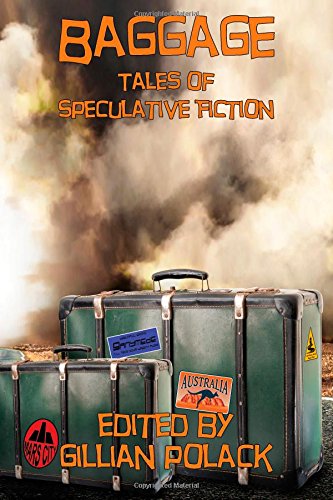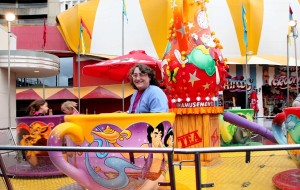Back in October last year, I mentioned that Borgo Press had reprinted Baggage, an anthology of Australian speculative fiction that I had been honoured to work on as sub-editor. This is an anthology I am truly excited about and was thrilled to be part of. So today I’m sharing an interview with the editor (and my friend and mentor) Gillian Polack.
For those who are unfamiliar with the book, would you mind sharing a little bit about how Baggage came about?
Eneit Press had just published Life through Cellophane (now known as Ms Cellophane, and published by Momentum) and Sharyn Lilley and I were exchanging what I thought was just a fun set of emails. What would be your dream anthology? Who would you ask to be in it? That sort of thing. Except she was dead serious, as I found out when she gave me the pay rate to offer my dream writers.
It goes back further than that, though. Sharyn knew that one of my abiding interests is how people interpret the world around them, how they carry their culture and use it to shape and understand their lives. She also knows I am somewhat addicted to speculative fiction. It was a given that, given a dream anthology, I would ask writers to tell their speculative fiction tales through the lens of cultural baggage.
This theme of how people interpret the world and their lives through their culture is one that also occurs in your most recent novel Langue[dot]doc 1305. In the time between the release of these two books, how much has changed in the way you view this theme?
The way people view their world and live their lives is something I put into all my novels. These views, in fact, shape my novels. As I grow older, I learn more about people whose lives are different to my own and I find ways of understanding them (hopefully) enough so that I can write these people into my novels. It’s funny, so many of my readers tell me that this character is me or that character is me (I just had one tell me that Artemisia is me). What they are is me exploring the lives of others, so there is some overlap with things I know and this overlap leads to experiences I’ve never encountered and means I get to write about people I’ve never dreamed of being. As my wish to understand people shapes my novels, the understanding I try to achieve helps shape my life.
You were recently the GUFF delegate at Loncon and the Guest of Honour at Liburnicon. What was the most interesting piece of baggage—cultural or otherwise–you encountered on your trip?
I think the most interesting piece of baggage was my own. While I have no trouble doing the big things (presenting a Hugo, giving a Guest of Honour talk at Liburnicon) it doesn’t make me terribly happy. I love finding people who share interests and passions far more than I enjoy looking important.
How is this baggage? I found myself at the back of the stage, waiting to present that Hugo and thinking “This should have been someone else.” Australian culture is misogynistic: we are trained, and we train ourselves to ensure that men are seen and that women are worthy supporters. Once I realised that being a worthy supporter was entirely appropriate for an awards presentation (for the winner of the award is the centre of it) I was fine. It wasn’t the right thing at Liburnicon at all – I’m still thinking about that.
What was one highlight of working on Baggage?
Working on Baggage was full of many, many wonderful things but there’s one thing I haven’t talked about much and it’s at the heart of the book. I had worked on cross-cultural awareness and understanding for years before I edited Baggage. I’ve taught it to diplomats and to senior public officials and to community groups. By teaching these subjects, I learn about them from my students. This is what happened with Baggage, only it was a different kind of learning. Writers can reach deep into themselves when they write their best work. In some cases – Tessa Kum’s and KJ Bishop’s are the ones that always come to mind first – as they pushed their stories and shaped their ideas, I went on a tremendous voyage of discovery in their wake. I didn’t learn about culture and cultural baggage in the way I tended to when teaching; I learned about how it becomes a part of someone’s soul and where it can take a person.
Gillian’s most recent novel is Langue[dot]doc 1305 (Satalyte). Her next novel will be the cursed one, The Art of Effective Dreaming, and will also be published by Satalyte this month. Polack is a writer, editor, historian and critic. Baggage was short-listed for a Ditmar and has recently been reprinted by Borgo. Gillian’s second novel Ms Cellophane (also a Ditmar finalist) was recently published by Momentum. She has sixteen short stories published. One of her stories won a Victorian Ministry of the Arts award and three more have been listed as recommended reading in the international lists of world’s best fantasy and science fiction short stories.


